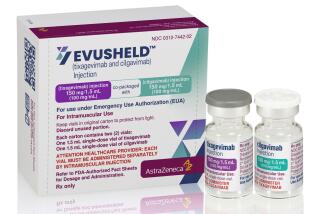New Drug for AIDS Infection Approved : Health: FDA permits use of product to fight a condition that often results in blindness among people with weakened immune systems.
- Share via
WASHINGTON — The Food and Drug Administration on Friday approved a new drug to treat a serious AIDS-related infection that often results in blindness.
The drug, foscarnet, was approved to treat cytomegalovirus retinitis, an eye infection that can cause blindness in people with weakened immune systems. CMV retinitis afflicts an estimated 46% of AIDS patients who have reached the latter stages of the disease, the FDA said.
It is the second drug to be approved for the condition. The first, ganciclovir, was approved for marketing in June, 1989, but about 40% of AIDS patients with the infection cannot tolerate its side effects, which include inhibited production of white blood cells by the body’s bone marrow.
Neither drug cures the condition, but they can significantly delay the progression to blindness, the agency said.
“Today’s approval is the latest in a series of AIDS-related drug developments that bring renewed hope to many with AIDS,” said Health and Human Services Secretary Louis W. Sullivan in a statement. “In particular, it could help improve the quality of life for those AIDS patients whose eyesight is at risk from CMV retinitis.”
Foscarnet also has been shown to have toxic side effects, including kidney damage, abnormal electrolyte levels in the blood and seizures.
“The toxicity profiles of the two drugs are very different,” said Dr. Nigel Rulewski, vice president for medical affairs of Astra Pharmaceutical Products Inc., of Westborough, Mass., which will market the drug under the trade name Foscavir.
“As with all drugs, it has problems of its own, but these are very different from ganciclovir,” he said in an interview.
The drug, which must be taken intravenously every day for life, costs $58 a day, Rulewski said. That cost is for the drug only and does not include the expense of administration, he said.
Rulewski said the company would establish “an expansive indigent program” to ensure that patients who cannot pay for the drug, or who lack insurance coverage, will still be able to receive it.
“Anyone who cannot afford the drug will be able to receive a free supply,” he said. “As part of the program, we will also be trying to help advise these patients how best to obtain insurance coverage.”
Clinical studies have shown the drug to be effective in treating the condition, the agency said, and a trial comparing foscarnet with ganciclovir is in progress. Results from that study are not yet available, the FDA said.
Since August, 1990, the drug has been available under a special FDA program to patients who are unable to use ganciclovir.
“The availability of an alternative treatment for this disease adds a new dimension in the fight against AIDS, as it gives patients and physicians more options in combating this disease,” FDA Commissioner David A. Kessler said in a statement. “FDA is determined to help broaden the array of drugs to treat AIDS and AIDS-related conditions.”
In 1989, when ganciclovir was approved, the FDA said that CMV retinitis threatens the sight of nearly one in four AIDS patients. CMV is an extremely common virus that is present in an estimated 60% of the adult population, but is of little consequence to people with healthy immune systems. In individuals with impaired immune systems, however, the virus often attacks the optic system, destroying vision.
Foscarnet is the eighth drug that has been approved for treating AIDS or an AIDS-related condition.
Other approved medications are AZT, or zidovudine, which inhibits replication of the human immunodeficiency virus and is the only antiviral drug available; aerosol pentamidine, which is used to prevent episodes of pneumocystis carinii pneumonia, a life-threatening respiratory infection common to AIDS patients, and injectable pentamidine, which is used to treat pneumocystis carinii pneumonia.
Also, recombinant human alfa interferon, a therapy for Kaposi’s sarcoma, a capillary cancer associated with AIDS; fluconazole, which is used to treat two conditions, cryptoccocal meningitis and candidiasis, a yeast infection also known as oral thrush, and erythropoietin, a therapy for the severe anemia sometimes associated with AZT treatment.
More to Read
Sign up for Essential California
The most important California stories and recommendations in your inbox every morning.
You may occasionally receive promotional content from the Los Angeles Times.













